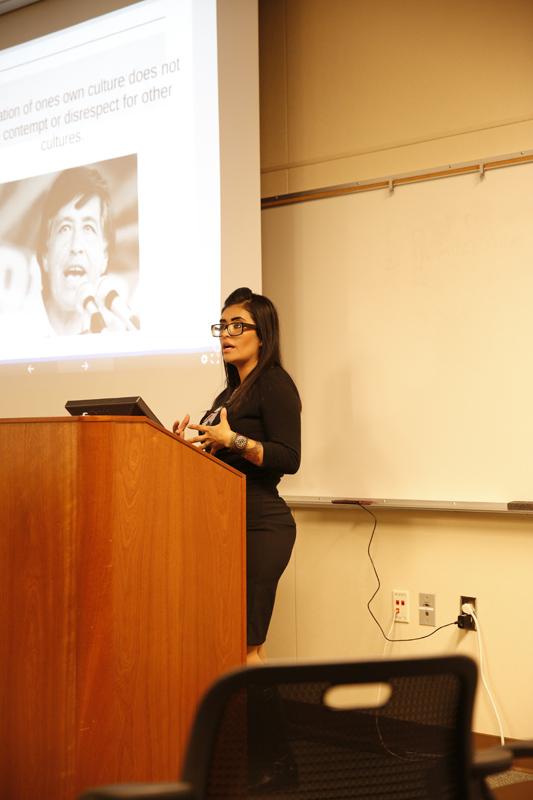Day for Cesar Chavez
April 5, 2016
Cesar Chavez was a Mexican American farm laborer and an influential civil rights activist who fought for the rights of farm workers.
His strife went on to impact the lives of farm laborers and their families to this day.
On March 31, Cesar Chavez’s birthday, Bakersfield College’s MECha took it upon itself to celebrate his memory and lifelong impact for the immigrant and farm labor community.
The celebration took place at the Levan Center for Humanities at 11:30 a.m. A brief PowerPoint presentation was given, and questions were answered afterward.
MEChA secretary and communications major Dezivon Manos, 30, began the presentation by giving the audience a brief introduction of Cesar Chavez’s life.
“He was a Latino civil rights activist in the aspect that when he saw the way that the field workers were treated. He brought it upon himself to make a difference,” said Manos about Chavez. “This brought about the start of a union that today we know as the United Farm Workers.”
According to Manos, Cesar Chavez created the UFW and dedicated himself to La Causa [the movement] after he quit his prior job in which he worked for 10 years.
Manos said, “It was created for La Causa, and in this case the movement was to better the working conditions of migrant workers.”
The presentation then shifted its focus to the 340 Mile March from Delano to Sacramento, which was led by Cesar Chavez.
According to Manos, the march began with just 67 workers.
As they marched from city to city, the number of workers who participated grew substantially.
Grape growers felt pressure upon the arrival of the marchers and agreed to certain changes that were demanded, and they also signed a contract with the UFW.
Again, the presentation shifted its focus, this time to the Safeway Boycotts.
According to a video presented by MEChA, these boycotts were peaceful and demanded a change in which Safeway grapes were produced. Boycotters demanded that shoppers not buy these grapes and urged them to buy only the ones with a UFW sticker.
Both peaceful protests deemed successful and, according to Manos, peaceful protest was the method Cesar Chavez found to be most effective.
A question and answer session followed the presentation.
When asked if similar instances still occur today, Manos said yes. She added that the only difference is that “Those types of problems actually have a route now to where they can be fixed,” because of Cesar Chavez.
MEChA vice president and political science major Tania Bernal, 24, contributed to answering this particular question and stated that one issue that is very prevalent today is the rape of undocumented women in the fields.
According to Bernal, these women are afraid to seek help from law enforcement because of their undocumented status.
In addition to that, many farms still do not pay their workers the minimum wage.
Manos then added, “You have the migrant worker who is undocumented, what do they do? There are programs that are available and that can help them, but they have to seek the information. We have to help get the word out there.”
The discussion then became a political one.
Bernal introduced the topic of immigration reform.
According to Bernal, there is a bill in the senate for immigration reform that has not yet passed.
She went on to say that currently 11 million people in the United States are undocumented. If the bill does not pass, they will remain so.
“That’s why immigration reform is so important, and that’s why voting is so important,” Said Bernal. “You got to make sure you’re voting for someone who’s going to represent your ideals and represent your people.”
She added that under the Obama administration there have been approximately 2.5 million deportations, and that the election of Donald Trump is something “we” do not want to happen.
“One of things we do need to do is educate ourselves so we can educate our community,” Bernal said.
An audience member then made the statement that it us up to informed citizens to make a difference.
Manos agreed, and added that an advantage Cesar Chavez had was that he was a first generation Mexican American.
Manos concluded the presentation and said, “That’s why Cesar Chavez made such a huge impact, because he was a voice for those who couldn’t speak.”







